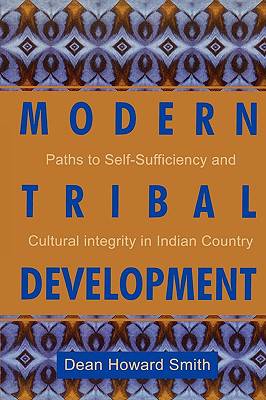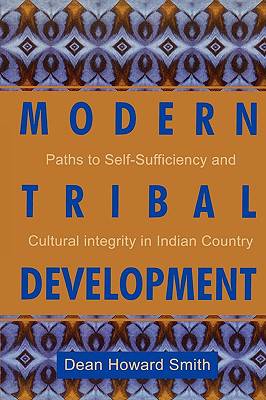
Bedankt voor het vertrouwen het afgelopen jaar! Om jou te bedanken bieden we GRATIS verzending (in België) aan op alles gedurende de hele maand januari.
- Afhalen na 1 uur in een winkel met voorraad
- In januari gratis thuislevering in België
- Ruim aanbod met 7 miljoen producten
Bedankt voor het vertrouwen het afgelopen jaar! Om jou te bedanken bieden we GRATIS verzending (in België) aan op alles gedurende de hele maand januari.
- Afhalen na 1 uur in een winkel met voorraad
- In januari gratis thuislevering in België
- Ruim aanbod met 7 miljoen producten
Zoeken
Modern Tribal Development
Paths to Self-Sufficiency and Cultural Integrity in Indian Country
Dean Howard Smith
€ 80,95
+ 161 punten
Omschrijving
First Nations people know that a tribe must have control over its resources and sustain its identity as a distinct civilization for economic development to make sense. With an integrated approach to tribal societies that defines development as a means to the end of sustaining tribal character, Dean Howard Smith offers both conceptual and practical tools for making self-determination and self-sufficiency a reality for Native American Nations. Through a century of changes in federal policy, tribal development has typically been viewed through mainstream society's goals and system, or according to some pan-Indian framework. Instead, Smith argues that any development prospectus must be created and evaluated within the dictums of the individual indigenous social structure. Otherwise, a tribe must choose between cultural integrity and economic development. Smith draws from his extensive experience as a consultant, teacher, and instructor to offer a wide variety of detailed case studies, and readers will learn from both successful and failed development initiatives. While focused on the United States, his work will be applicable for indigenous peoples in many parts of the world. In addition to tribal employees and communities, Modern Tribal Development will be important reading for scholars and students in Native American studies, development studies, community planning, and cross-cultural studies.
Specificaties
Betrokkenen
- Auteur(s):
- Uitgeverij:
Inhoud
- Aantal bladzijden:
- 184
- Taal:
- Engels
- Reeks:
Eigenschappen
- Productcode (EAN):
- 9780742504103
- Verschijningsdatum:
- 14/06/2000
- Uitvoering:
- Paperback
- Formaat:
- Trade paperback (VS)
- Afmetingen:
- 154 mm x 226 mm
- Gewicht:
- 276 g

Alleen bij Standaard Boekhandel
+ 161 punten op je klantenkaart van Standaard Boekhandel
Beoordelingen
We publiceren alleen reviews die voldoen aan de voorwaarden voor reviews. Bekijk onze voorwaarden voor reviews.









